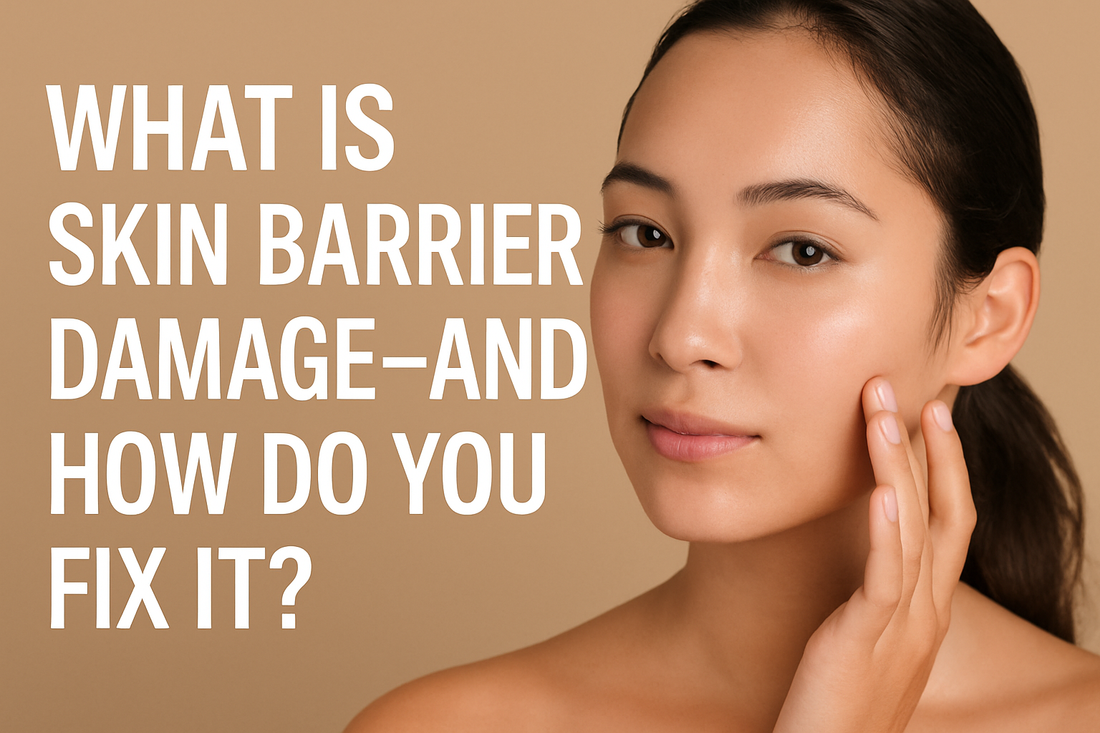
Understanding Your Skin Barrier: The Unsung Hero of Skincare
Beneath the glow, beyond the breakouts, and underneath every skincare product you apply lies something foundational: your skin barrier. Often described as the “brick wall” of your skin, the barrier is part of the outermost layer—known as the stratum corneum—and it plays a vital role in maintaining skin health. Imagine your skin barrier as a shield, composed of skin cells (the “bricks”) held together by lipids (the “mortar”), designed to keep the good stuff in (like moisture and nutrients) and the bad stuff out (like bacteria, pollutants, and irritants).
A healthy barrier means hydrated, calm, and resilient skin. But when that barrier is compromised, everything can go haywire. You might notice your skin becoming red, itchy, flaky, or reactive to products that never bothered you before. Suddenly, even your go-to moisturizer doesn’t seem to be doing its job. That’s the impact of barrier damage—and unfortunately, it’s more common than you think.
How Does the Barrier Get Damaged in the First Place?
Ironically, many of the things we do in pursuit of “better” skin can actually weaken our skin’s natural defenses. Over-exfoliating—especially with strong acids or scrubs—can strip away protective oils and damage the barrier. Using multiple active ingredients at once (think: retinol, AHAs, vitamin C, etc.) without proper layering or recovery time can overwhelm the skin. Even everyday habits like using hot water when cleansing, skipping moisturizer, or over-cleansing can contribute to a disrupted barrier.
Environmental factors also play a role. Cold weather, low humidity, wind, pollution, and UV exposure all take their toll on the barrier over time. And then there’s stress—both emotional and physical—which can trigger internal inflammation, further impairing the skin’s ability to function optimally. The result? Skin that feels sensitive, looks dull, and behaves unpredictably.
The Signs You Might Be Ignoring
Barrier damage doesn’t always show up as dramatic flaking or painful redness. Sometimes it’s subtle. You might notice that products you once loved now sting. Your skin might feel tight even after moisturizing. Or you might experience breakouts in areas that are usually calm. These are all signs that your skin is asking for help.
Another key indicator is trans-epidermal water loss (TEWL)—when your skin loses more moisture than it can retain. This leads to dehydration, which can exaggerate fine lines, cause inflammation, and worsen conditions like rosacea, eczema, or acne. If your skin never quite feels "settled," your barrier might be at the root of the issue.
How to Repair and Rebuild a Damaged Skin Barrier
Restoring your skin barrier doesn’t require dozens of steps—it requires smart ones. The first step is to stop what’s causing the damage. Scale back on exfoliants, avoid aggressive ingredients, and simplify your skincare routine. Less is more during the healing process.
Next, focus on replenishing. Look for moisturizers and serums that contain barrier-repairing ingredients like:
-
Ceramides: Help reinforce the lipid matrix and strengthen the skin’s structure.
-
Fatty Acids & Cholesterol: Essential building blocks that restore flexibility and hydration.
-
Hyaluronic Acid: A humectant that draws water into the skin and helps improve elasticity.
-
Peptides: Support collagen production and aid in skin recovery.
-
Probiotics & Postbiotics: Help balance the skin microbiome and calm inflammation.
Your cleanser also matters. Choose a non-stripping, pH-balanced cleanser that won’t disrupt the skin’s acid mantle (the slightly acidic film on your skin that supports microbial balance and barrier integrity). And always, always use SPF—even when indoors. UV rays continue to harm already weakened skin, making sun protection a non-negotiable.
How Long Does It Take to Heal?
The skin’s barrier can begin to recover within a few days of consistent care, but full repair may take several weeks. If damage is more severe—like with chronic conditions or after overuse of actives—it can take months. That’s why patience and consistency are crucial. Stick to your simplified routine. Don’t chase instant results. Your skin is healing on its own timeline.
Why Barrier Health is the Future of Skincare
As skincare trends shift away from “more is better” and toward holistic, functional beauty, barrier repair is becoming a core focus. Science is showing us that when you support the skin’s microbiome and barrier—not fight against it—you get better, more sustainable results.
Instead of masking issues, you’re addressing the root cause. Your skin becomes less reactive, more hydrated, and better equipped to defend itself against aging, breakouts, and inflammation. It's not just about looking good—it's about strengthening your skin from the inside out.
Final Thoughts
Your skin barrier is more than just a layer. It’s a system of protection, communication, and balance. Treat it with respect, and it will reward you with healthier, more resilient skin. Whether you're recovering from over-exfoliation or simply looking to future-proof your skincare routine, focusing on barrier health is one of the smartest moves you can make.
Because healthy skin doesn’t start with trends—it starts with trust. And trust begins with balance.